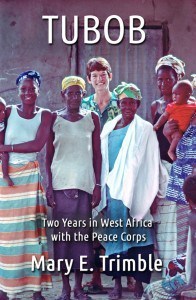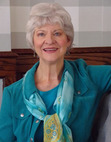Heidi M. Thomas's Blog, page 16
October 11, 2012
The right words don’t always come easily. For those who w...
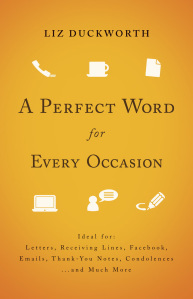 The right words don’t always come easily. For those who want to bless others with words that go beyond cliches,
A Perfect Word for Every Occasion
by Liz Duckworth offers examples and guidelines for things to say, lines to write, and Scripture verses to share. Readers will find words to use anywhere: Facebook messages, emails, cards, receiving lines, birthdays, anniversaries, texting, graduations, emotional occasions, and more. They’ll even discover what not to say.
The right words don’t always come easily. For those who want to bless others with words that go beyond cliches,
A Perfect Word for Every Occasion
by Liz Duckworth offers examples and guidelines for things to say, lines to write, and Scripture verses to share. Readers will find words to use anywhere: Facebook messages, emails, cards, receiving lines, birthdays, anniversaries, texting, graduations, emotional occasions, and more. They’ll even discover what not to say.
Congratulations on your newest book, Liz. How did this book come about?
Because I’ve worked in publishing, I have a lot of friends who are book editors. One of them, from Bethany House, suggested my editor ask me about writing a book for them, based on an outline they had created. My kids are off to college, and though I have a full-time job, I don’t have much else to keep me from saying “no” when an opportunity like this comes up! Also I thought, “Sure, writing about writing. Easy, right?” In the end, it was difficult, but I’m pleased with the results. It’s never as easy as you think, or you wouldn’t want to take on a book-length project. Denial is a wonderful friend.
How did you get started in the inspirational book field? For more than 20 years I was a book editor for Victor Books, David C. Cook and other publishing houses, and also freelanced as an editor for a time. The first book I wrote, Wildflower Living, was published by WaterBrook Press, where I had spent two years as publicist. By that time I was freelancing and wanted to do a book about nurturing inner strength after personal loss, based on my own experiences and those of people in my circle.
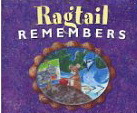 Tell us a little about your children’s book, Ragtail Remembers and how you came to write it.
Tell us a little about your children’s book, Ragtail Remembers and how you came to write it.
A friend I’d worked with when I was editing children’s picture books had been asked by a hospice organization if he could create and illustrate a book about the stages of grief for very young children. I wrote a manuscript for him, but by then, he was on to other projects. I found out about Centering Corporation from a friend in my writers’ critique group who helped evaluate the book. I submitted it 3 years in a row (Centering Corp. only accepted new projects once a year), and made changes suggested by the acquiring editor. The third year I sent it in, my letter was dated September 10, 2011. They accepted the manuscript and, on my recommendation, hired another friend to illustrate it. Many of their grief and loss books were donated to families in the wake of the 9/11 attacks. I know this simple little picture book has helped young children understand their emotions after a loss.
If you had to choose, which writer would you consider a mentor (or a favorite author)? My dear friend, Jane Kirkpatrick. I first met her when I was publicist at WaterBrook Press, and later she wrote the foreword for Wildflower Living. She amazes me with her talent and generous spirit! Also, my mom, Jane Morton, and I attended Linda Hasselstrom’s retreat at Windbreak House. Linda was an incredible help in getting my first book into shape. I love her writing in so many ways; it’s so true, honest, clear and beautiful.
What book are you reading now? I just finished The Life of Pi. I wanted to read it before the film comes out in November. It is a mind-bogglingly fantastic work of fiction! So many levels to it…I highly recommend it.
Is there anything you find particularly challenging in your writing? Just writing itself. I’m of the “I don’t enjoy writing, I enjoy having written” school of writing. But I want to pursue fiction and hope I can turn it from effort and chore into play and passion.
What is your professional background? I worked in Christian book publishing 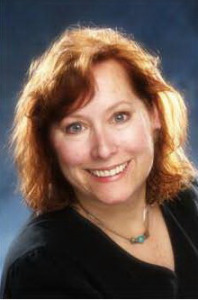 for many years as an editor before I became a freelance writer. Now I’m back working in marketing for Compassion International, heading a small team of writers and editors for the in-house agency. But I’ve also been a radio news reporter and a teacher, so I’ve got war stories there in the background (it hasn’t all been Bible studies and picture books)! Ultimately, I have to say, the world of book publishing has given me wonderful professional relationships and friendships to last a lifetime. And it was a great training ground.
for many years as an editor before I became a freelance writer. Now I’m back working in marketing for Compassion International, heading a small team of writers and editors for the in-house agency. But I’ve also been a radio news reporter and a teacher, so I’ve got war stories there in the background (it hasn’t all been Bible studies and picture books)! Ultimately, I have to say, the world of book publishing has given me wonderful professional relationships and friendships to last a lifetime. And it was a great training ground.
What is Liz Duckworth Publishing Services? That just a name to put on my business card and stationery during the 8 years I was full-time freelancing. I felt it covered my (failed) efforts as an agent as well as (successful) editing and copy-writing I did at the time. It works for so many scenarios…feel free, anybody, to use it by inserting your own name in place of mine!
Are you working on a new project? I should be! My plan was to have a terrific fiction proposal to shop around at the Women Writing the West conference. Probably won’t happen, Heidi. Fiction is soooo hard!
Liz Duckworth is committed to helping others overcome their losses and learn to pursue their dreams again. In addition to numerous magazine articles, Liz has published two picture books, God’s Great Creation and Ragtail Remembers, the latter to help young children understand grief and the feelings that follow loss. With almost twenty years of experience in the Christian publishing field, Liz heads up Liz Duckworth Publishing Services.
Liz’s books can be found at Amazon and possibly Christian bookstores. But Wildflower Living and Bloom Before You’re Planted are both out of print. (They can be found in cartons in my basement.)
Website: LizDuckworth.net (currently under construction.)
Social media connections: Facebook: LizMortonDuckworth and Twitter: LizDuckworth (I seldom tweet, but may try a tweet-a-day again like I did last year in November. Called it “Tweet-vember.”) I have a great Youtube connection: my kid! Jon’s site, simplyspoons, has 91,000 subscribers. He’s 22. In my whole life, I’ve never come close to that many readers. The world has gone upside-down. Maybe I need to start making parody music videos?


September 27, 2012
Writing My Memoir, TUBOB: Two Years in West Africa with the Peace Corps
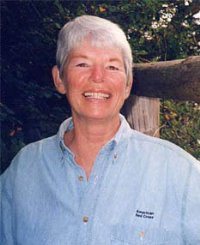 My friend and writing colleague in Women Writing the West, Mary Trimble, has just published her memoir about her two years in the Peace Corps in Africa. Tubob means “stranger”. I’ve asked Mary to share her writing journey for this book.
My friend and writing colleague in Women Writing the West, Mary Trimble, has just published her memoir about her two years in the Peace Corps in Africa. Tubob means “stranger”. I’ve asked Mary to share her writing journey for this book.
by Mary E. Trimble
Writing this memoir was both scary and satisfying. It was absolutely essential for me to be true to our Peace Corps experience, yet I knew it had to be a satisfying read in order to hold reader interest. I’ve never kept a journal, but as we left for Africa we asked our families to save all our letters home. Although I vividly remembered much of our two-year experience in The Gambia, reading our letters home served as rich resource material. From our letters I was reminded of the chore of putting a meal on the table, of the hospital conditions where I worked, Bruce’s job frustrations at the United Nations well-digging shop, our friends, both African and expatriate, our sometimes too-frequent house guests, and the terror of being caught up in an attempted military coup.
Once I started TUBOB, it came together very quickly and I grew confident that what I had to share would be of interest. My husband Bruce took hundreds of slides while we were in The Gambia and he painstakingly converted many of them to digital images so that he could design TUBOB’s cover and also provide images at the beginning of each chapter, which helped set the tone of the book.
Take a look at this stirring book trailer.
MORTARS THUNDERED close to the house where 118 of us sought refuge. A particularly loud and close-sounding explosion made us jump and the house shudder. Not for the first time, I thought, Is this the end?
My Peace Corps supervisor Meri Aimes and I crouched under a small table with space only for the two of us. Others scrunched in where they could find room. My husband, Bruce, safely tucked under the desk he’d converted to a radio station, clutched the radio mic.
True, it was the American Ambassador’s house, but, though nice, it wasn’t the grand residence usually associated with a high-ranking officer’s home. At four thousand square feet, the concrete house wasn’t particularly large, not for this many people at any rate.
Our group of leaders had taken over the ambassador’s bedroom as a sort of headquarters, since the ambassador himself was “detained” at the embassy in The Gambia’s capital city, Banjul. Families occupied the other two bedrooms; otherwise, people squeezed in where they could.
Meri’s eyes were huge. Her African American face was always expressive, but never more so than just then.
This isn’t looking good, is it?” I said, trying to sound calmer than I felt.
Meri looked at me like I’d just made the understatement of the year. “Not really, no.”
“I’m wondering if Bruce and I will ever be able to get back to our village.”
“Right now I’d say it was doubtful.”
We both instinctively covered our heads at the sound of a close-by explosion. I broke out in sweat.
“I need to tell you something.”
Meri’s raised her eyebrows in question.
I waited until another flurry of rifle shots subsided. “We have about twenty-five hundred dollars buried in our chicken coop.”
“You what?”
“Well, what else can you do with American dollars? You can’t put it in a Gambian bank, we couldn’t keep it inside–we’ve already had our place broken into. We were converting our Gambian money into American cash so we’d have it when we left.”
Meri nodded. “You guys will probably be evacuated, but George and I likely will stay to get things wrapped up.” George Scharffenberger, Peace Corps Director, and Meri Aimes, Assistant Director, were the two highest ranking Peace Corps staff in the West African country of The Gambia. We were lucky they were both with us, safe. For the moment, at least.
Meri touched my arm. “I promise I’ll do everything I can to recover your money. Draw me a map showing me just where it is.” She shook her head. “Only you and Bruce would think to hide money in a chicken coop.”
A runner, gasping for breath, banged on the bedroom door. “Someone is coming!” Bruce sprang out of his shelter and, quick and smooth with practice, dismantled the radios, forbidden to us by both the rebels and nationalists. He stuffed them into boxes kept under the desk. Within seconds he crawled back under the desk, cramming himself in front of the boxes. He was good. I was so proud of him.
Bruce’s and my eyes locked. As we had joked many times in the past two years, we silently asked, “Whose idea was this anyway?”
Tom Mosier, head of United States Agency for International Development (USAID) in The Gambia, and George Scharffenberger came out from their safety places to greet our visitor. “Stay right where you are, folks,” Tom said, his voice tight.
The door opened and a man strode in. He was probably an officer in charge; he reeked of authority. We couldn’t tell if he was a nationalist or a rebel from the local security force, Field Force they called it, which, together with disgruntled leftists, had started the coup several days earlier. He was a big man and to me he looked sinister. My stomach clenched. His black face glistened with sweat. He carried a rifle and wore a hand gun at his side. His eyes darted around the room. “This is good. Stay under cover. I have ordered that this house is not to be hit, but you never know…”
He nodded to Tom and George, and left. No one spoke until we heard a soft knock on the door. He was gone. Bruce sprang up and reassembled the radios just as a signal was coming through. He brought the mic with him back under the desk.
“Candyland, Lollypop. Candyland, come in. You guys okay?”
Bruce responded, his rich voice calm. “Lollypop, Candyland. Yes, we’re okay. One of the local officers just paid us a visit and…” An explosion, even closer this time, drowned out his voice.
***
Mary is also the author of three novels, Rosemount, McClellan’s Bluff, and Tenderfoot, a Western Writers of America SPUR award finalist. Her books may be found at local bookstores, on her website, and on Amazon.


September 24, 2012
13 Common Grammar Mistakes and How to Avoid Them
We all have something that trips us up, grammar-wise, in writing, whether it’s the use of lie/lay or adding apostrophes with plurals. I want to share a wonderful resource with you, Mignon Fogerty’s GrammarGirl . Here is an article she wrote for Writers Digest, “The 13 Trickiest Grammar Hang-Ups.”
by Mignon Fogerty
I trust that you all know the difference between who and whom, and I trust that typos are the only reason you use the wrong it’s. It happens to the best of us. For most writers, if you can just maintain your focus (perhaps with caffeine and frequent breaks), you’ll get the basics right. The following problems, however, may have you scrambling for a refresher.
1. Half can be both singular and plural.

Typically, subjects and verbs agree: If the subject is singular, the verb is singular. If the subject is plural, the verb is plural. Easy peasy. However, sentences that start with half don’t follow this rule.
Half alone is singular: My half of the pizza is pepperoni. Yet although half is the subject in a sentence such as Half of the pizzas are missing, we use a plural verb because of something called notional agreement. It simply means that although half is singular, half of the pizzas has a notion of being plural, so you use a plural verb. Follow this rule when half is the subject of a sentence: If half is followed by a singular noun, use a singular verb. If half is followed by a plural noun, use a plural verb. Half of the pepperoni is ruined, but half of the tomatoes are missing.
Compound words that start with half are quirky too. They can be open, closed or hyphenated (e.g., half note, halfhearted, half-baked). There’s no rule that applies across the board, so you’ll have to check a dictionary.
For more tips, go to the article at Writers Digest.


September 20, 2012
Wasted Words
As writers we are told to avoid clichés, to come up with a new and better way to describe and characterize.
Here are some of my pet peeves:
Irregardless. It’s just plain regardless.
We’ll meet at 9 a.m. in the morning. As opposed to 9 a.m. in the evening?

The good doctor. Maybe he’s a bad doctor.
Very unique. Unique is a word unto itself. It doesn’t need any qualifiers. What is fairly unique? Uniquely unique?
At this point in time. Where else would it be?
At the end of the day. Probably a good phrase the first 5 times it was used, but now…sick of it!
Think outside the box. Again a good one the first 10 times, but…

I personally believe. As opposed to I impersonally believe?
It is what it is. Huh?
To be honest. That makes me think you might NOT be!
BBC’s Magazine has posted a funny list of its readers’ most hated cliché phrases.
To be honest and fair, going forward, this is basically something that, at the end of the day, we’re likely to touch base about again.
Let’s face it, the fact of the matter is that literally all of us succumb to the use of these stock phrases — even when bringing our A game and giving 110%.
What are your most hated clichés — and how do you avoid them?


September 18, 2012
The Next Big Thing Blog Hop
 Thanks to Janet Oakley who tagged me for this Blog Hop historyweaver.wordpress.com
Thanks to Janet Oakley who tagged me for this Blog Hop historyweaver.wordpress.com
If you want to participate:
1. Answer these ten questions about your current WIP (Work In Progress) on your blog
2. Tag five other writers/bloggers and add their links so we can hop over and meet them.
3. The questions with your answers
Here’s mine:
What is the working title of your book? Nettie’s Cowgirls
Where did the idea come from for the book? This is the third in my “Dare to Dream” series, based on my grandmother who was a real Montana cowgirl. The first book is Cowgirl Dreams (EPIC Award winner) and Follow the Dream (WILLA Literary Award winner).
What genre does your book fall under? Western Historical.
Which actors would you choose to play your characters in a movie rendition? That’s a difficult question. My grandfather looked like Charlton Heston, but of course that’s impossible. Maybe Jake Gyllenhall. Not sure who would play Nettie, a petite, feisty ranch woman with auburn hair.
What is the one-sentence synopsis of your book? Despite World War II and the demise of women’s rodeo where they competed on rough stock with the men, Nettie continues to follow her dream by mentoring young trick riders.
Will your book be self-published or represented by an agency? I have no agent. The publisher of my first two novels is Treble Heart Books http://www.trebleheartbooks.com
How long did it take you to write the first draft of your manuscript? Too long! Two years.
What other books would you compare this story to within your genre? It’s hard to say. My series has been compared to the Little House on the Prairie books in some ways, but it’s different. It’s not a romance, but has sweet romance in it, it’s not an old-time “shoot-’em-up” western but it takes place in the west and around the ranching and rodeo world. It’s basically a fictionalized story about my grandmother, who rode bucking stock in rodeos, and was an avid horsewoman. This book is more fiction than the first two, however, and delves into “what might have been.”
Who or What inspired you to write this book? My grandmother, who seemed ahead of her time, a woman who was the epitome of “Cowgirl Up”–do the hard thing without complaining.
What else about your book might pique the reader’s interest? It takes place in Montana during the 1940s and Nettie is faced with letting her son go off to war.
Thanks for stopping by this Blog Hop and please check out our host Susan Taitel http://susantaitel.com/2012/09/ and the other bloggers participating in this event, including historyweaver.wordpress.com, http://thomasaknight.com/, http://sydneyssong.net/blog/ and http://www.sieders.com/blog/
Also please peruse my blogroll links and visit some of my friends there!


September 17, 2012
Meet the Co-Authors, Who’s Got the Money? Part II
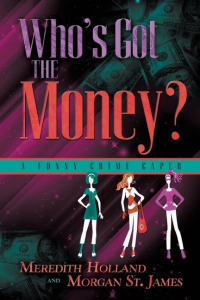 Who’s Got the Money is an amateur sleuth mystery, spiced with humor. Where did the idea come from?
Who’s Got the Money is an amateur sleuth mystery, spiced with humor. Where did the idea come from?
Morgan: You would not believe how many funny things happen in real life, particularly with the type of marketing position both of us held for four years. We’ve been inside the prison factories, military warehouses and “fought the battle” to get orders as high as millions of dollars. It was a zoo! Most people think of prison manufacturing as making license plates. They are shocked to find it’s almost a billion dollar a year business.
Which situations are based on things that have happened to you?
Meredith: The actual scam is fiction but many of the things the trio of sleuths experience were based in things that actually happened to us.
Morgan: For example, the scene with the sleazy guy offering sex in return for a big order really happened to me. Not in that particular job, but in another. He was the purchasing agent for a major aerospace company. Meredith and I also ran down the street in Anchorage, Alaska pushing a cart loaded with thousands of brochures looking for a place to dump them (A scene in the book) because the prison factory sent us thousands, not hundreds as requested for a trade show. The warehouses filled with merchandise stacked to the ceiling–that’s real. Some of our scenes are truly exaggerations, but others will sound familiar to our former co-workers if they buy the book.
How did each of you come to follow the path of a writer?
Meredith: This is my first book, collaborating with Morgan St. James.
Morgan: I began to write years ago with published magazine and newspaper articles. In the late 1990s my sister, Phyllice Bradner, also a published writer, and I developed the Silver Sisters Mysteries series. The first book in the series, A Corpse in the Soup, was released in 2006 and won an award in 2007. We followed it with two more and the fourth currently is in development. Meredith knew about my books and approached me with her idea for Who’s Got the Money? I knew it was great, and jumped at the opportunity.
What advice do you have for aspiring authors?
Morgan: It is really simple. Do your homework, learn your craft and don’t give up. Always put out a quality, well-edited product even if you self publish. I once read a Facebook rant that showed how important this is. The author was upset by poor reviews of a self-published book that lambasted spelling and grammar errors, information dumps, poor formatting and more. The rant was, “It should be about the story, not the mechanics.” No. That is not correct. When a reader pays for a book they deserve a professional product.
Meredith: I believe it’s important to network with other writers for encouragement, help, and promotion. Joining a local writer’s organization and writers conference will help you develop friendships and give you support as you develop your craft of writing.
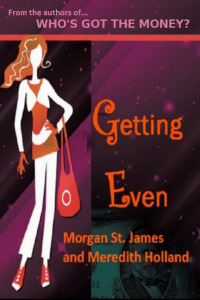 Getting Even, A prequel to Who’s Got the Money is available on Kindle only. This book tells how our heroine, Jennifer Hayes, gets even after the loss of her job and her money.
Getting Even, A prequel to Who’s Got the Money is available on Kindle only. This book tells how our heroine, Jennifer Hayes, gets even after the loss of her job and her money.
Morgan St. James bio: Award-winning Author/Speaker/Columnist Morgan St. James’ says her just-released books, Confessions of a Cougar, and Who’s Got the Money? are stories that begged to be told.
Her short stories appear in Chicken Soup for the Soul books, other anthologies. The recently released The MAFIA FUNERAL and Other Short Stories collection covers everything from true stories to fiction, mystery to romance and some genres in-between. She has written over 500 published articles relative to the craft of writing and people in the industry, as well as the book Writers’ Tricks of the Trade: 39 Things You Need to Know About the ABCs of Writing Fiction.
Meredith Holland bio:
This is Meredith Holland’s debut novel. She graduated college armed with a degree in Interior Design and designed environments including commercial spaces from healthcare and educational facilities to hospitality. Her diverse background and passion for problem solving combined with her interior design education easily qualified Meredith for the position of sales executive, marketing products manufactured by The Department of Corrections.
As a marketing representative she supported the programs, products, inmate rehabilitation mission, and government policies. Meredith says she appreciated her time spent growing her region’s Federal customer base and interacting with contracting agents and clients.
St. James and Holland met while they were both part of the marketing team for prison-manufactured furniture and conceived the idea for this comical crime caper. Meredith resides in Seattle, Washington with her husband and son.
You can find Meredith blogging at http://funnycrimecapers.blogspot.com
Morgan’s websites:
http://morgan-james.blogspot.com
http://silversistersmysteries.wordpress.com http://funnycrimecapers.blogspot.com http://writerstricksofthetrade.blogspot.com
You also can connect with Morgan on Twitter: @MorganStJames, and Facebook: facebook.com/morganstjames


September 13, 2012
Co-Authoring a Novel: Who’s Got the Money?
My guests this week are writing duo Morgan St. James and Meredith Holland who collaborated on a very entertaining, exciting and humorous novel, Who’s Got the Money?
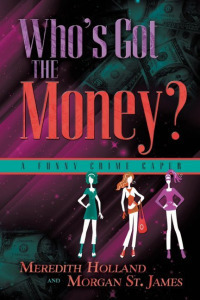 Synopsis: With $800 Million worth of products produced in federal prisons every year, division director Abby Hamilton had a diabolical scheme to become a very wealthy woman. In fact, she had almost reached her $35 million goal when she made the mistake of hiring three savvy women who blew the lid off Pandora’s box. Despite comical backfires, Jennifer, Kate and Cameron were determined to find out what happened to missing bonus money and managed to pull off an intensive amateur undercover investigation. What they discovered was shocking evidence of something so much bigger—Abby’s clever multimillion dollar embezzlement plot.
Synopsis: With $800 Million worth of products produced in federal prisons every year, division director Abby Hamilton had a diabolical scheme to become a very wealthy woman. In fact, she had almost reached her $35 million goal when she made the mistake of hiring three savvy women who blew the lid off Pandora’s box. Despite comical backfires, Jennifer, Kate and Cameron were determined to find out what happened to missing bonus money and managed to pull off an intensive amateur undercover investigation. What they discovered was shocking evidence of something so much bigger—Abby’s clever multimillion dollar embezzlement plot.
How did the two of you come to collaborate on writing a book?
Morgan: Meredith and I both have backgrounds in interior design and design related sales. We met while working for a private contractor who marketed furniture manufactured in the real Federal Prison Industries factories and became fast friends. Meredith knew I’d written several funny mystery books and after we both resigned from the now defunct company she approached me with her idea.
Meredith: Our experience with manufacturing arm of the Federal Prison system allowed us to develop an interesting angle for Who’s Got The Money.
How do you handle it—do you each write a scene or chapter?
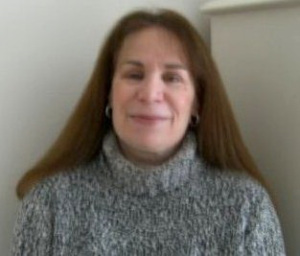 Meredith: Morgan and I collaborate and brainstorm. Working with a partner helps to see the potential in ideas I might otherwise not use.
Meredith: Morgan and I collaborate and brainstorm. Working with a partner helps to see the potential in ideas I might otherwise not use.
Morgan: Because I’m the seasoned author, Meredith was my idea person. She has a quick wit and remembered many incidents I didn’t. Between us we hatched a plot that according to a retired undercover FBI agent, really could have worked. I did the majority of the writing and preliminary editing and Meredith just kept those ideas flowing, but also let me know when she didn’t agree with something I’d written. Then we worked it out until both of us were satisfied.
What was the hardest thing to overcome in writing with a partner?
Morgan: From my experience and the talks I give to other writers, I’m quite aware of what will work and won’t work. I’ve written with various writing partners in the past, but all were trained writers, so the challenges were different. I had to make sure our clues and plot were not too complicated or convoluted, because then you lose or confuse the reader. It had to be something everyone could easily understand.
Meredith: Working with a partner helps you stay focused and helps you be more productive. Our differences or the creative yin-yang are important to collaboration that helps to develop the story line and bring an extra range of knowledge to tap.
What is the best thing about being a co-author?
Morgan: I love the interaction. My epitaph will say, “She wrote well with others.” Writing is a solitary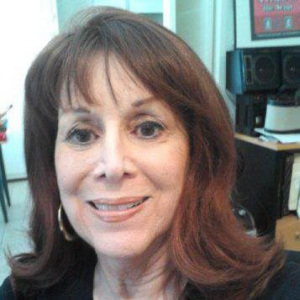 endeavor if you are writing solo. When you have a co-author there is the exchange and balance of ideas and techniques, plus the friendship and fun conversations. You always have the opportunity to learn something new from your co-author.
endeavor if you are writing solo. When you have a co-author there is the exchange and balance of ideas and techniques, plus the friendship and fun conversations. You always have the opportunity to learn something new from your co-author.
Meredith: Working or collaborating with a partner can make you a better writer. We learned to accept and welcome our differences.
Have you written or are you writing other books together?
Not at the moment, but we made sure to leave an open end for Who’s Got the Money? which presents a myriad of possibilities for future books featuring our trio of amateur sleuths.
Where can readers buy Who’s Got the Money? It can be ordered from most online booksellers or from your favorite local bookstore.
Stay tuned for part two of this interview, when Morgan and Meredith talk more about the book and how they each got into writing.
You can find Meredith blogging at http://funnycrimecapers.blogspot.com
Morgan’s websites:
http://morgan-james.blogspot.com
http://silversistersmysteries.wordpress.com http://funnycrimecapers.blogspot.com http://writerstricksofthetrade.blogspot.com
You also can connect with Morgan on Twitter: @MorganStJames, and Facebook: facebook.com/morganstjames


September 7, 2012
Meet the Author: Amy Levi
My guest this week is Amy Levi, author of the debut novel The Altar Call. This story of redemption is an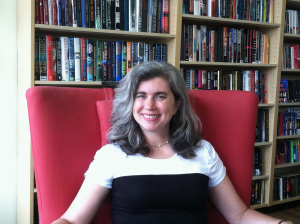 edgy, well-crafted roller coaster ride. Will you identify with Jeremy whose jealous rages cost him his family, with Melanie who is abused by her father, or others who have lost loved ones and the will to live?
edgy, well-crafted roller coaster ride. Will you identify with Jeremy whose jealous rages cost him his family, with Melanie who is abused by her father, or others who have lost loved ones and the will to live?
Welcome, Amy. What inspired you to write this book?
Maeve Binchy, author of Circle of Friends, wrote two intriguing novels, The Evening Class and The Lilac Bus. Both deal with real-life situations such as going to class and riding the bus where people spend time together on a consistent basis yet know very little of what is really going on in the precious lives of those who surround them. I wondered how that could be done in the Christian world. Then I remembered how many times I’d seen people go forward to the altar with forlorn looks and wondered, what happened to my friends?
Have you always had the urge to write or is this something new in your life?
It’s something I’ve given thought about periodically and jotted down on my bucket list, but I can’t honestly say I’ve always had the urge. It wasn’t until I conceived the idea of The Altar Call that it became serious. I couldn’t let it go. When I went for walks in the woods, characters developed in my mind. After a year, I sat in front of my laptop and it all poured out of me.
You obviously love books, as you and your husband own a bookstore. Who are some of your favorite authors and how did they influence your writing?
Oh Heidi, I think to give this answer justice, I’d have to ask you to my bookstore and coffee house here in Darrington and spend an afternoon bringing you mochas, but I’ll give it a shot. Aside from Maeve Binchy, I am fascinated by how Francine Rivers has brought biblical characters to life in modern times, creating new love for lasting truths. I thought of her as I wrote Elena’s story. Joan Didion’s way of bringing the stream of consciousness during the grieving process to a relatable place in the reader’s heart in her novel, The Year of Magical Thinking, was a great inspiration for me in writing Mark’s story. There are too many authors to name who have taught me that strong conflict from beginning to end is what keeps readers up all night and thinking about the characters the next day.
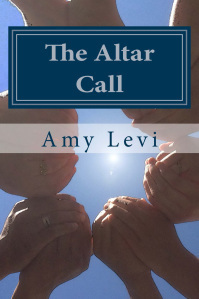 Tell us a bit about your writing process.
Tell us a bit about your writing process.
I did a lot of trouble-shooting in my mind before I sat down to write and had a solid idea as to where I was headed with it. As soon as my fingers touched the keys, I saw the story unfold before my eyes. Then with every sentence I created I asked the question, “Why should anyone read this?” If the answer was, “They shouldn’t,” it was either rephrased or deleted. My mother is a therapist for women of domestic violence. I tapped into her expertise to make sure the psychology was spot on. Then I read through it again and again around a dozen times, on the hunt for areas requiring finesse. Then I had it professionally edited by our friend Heidi Thomas, and the work began again.
The Altar Call is a faith-based story about the depths of despair and the hopes of redemption. Tell us what led to your decision to self-publish.
I pitched my story to a few Christian editors and publishers, and received letters saying that my work was “too edgy for their readers” and one said they were looking for “Grandma Betty” material. Everyone loves a cozy, light novel, but the magic of my book is that it’s about real people with real struggles. I was insulted as a reader that they felt all I wanted to read were stories that would merely touch the surface of issues I face and not go deeper. I give myself more credit than that, and I believe that lovers of Christian fiction everywhere are deserving of it as well.
I think nearly everyone will find a character he or she can identify with. Are they based on people you’ve known or experiences you’ve heard about?
All the stories have elements in my own life and others around me folded in the pages. It’s what makes it real. My husband teased me when he turned his head and saw tears flooding my cheeks while I was writing. I felt like I was there, living their pain right along with my new friends.
Is there a theme you would like your readers to take away from this book?
Definitely. All the characters have one thing in common. Anger and bitterness from the refusal or inability to forgive is destroying them. They put on a mask to show everyone they’re fine, life is perfect, but it’s a lie. They must conquer the treacherous mountain, claiming victory over past wounds through the blood of the Savior, and discover the beauty and freedom only found in forgiveness.
What was the hardest part of writing your book?
The Altar Call is a roller coaster ride. There are moments of romance, joy, and success followed by deep depression, loss, and trauma. The hardest part for me, was knowing how far past the line I could go. I brought it as far as I could handle it myself, and then had others read it, asking them for their opinion. The feedback was positive.
What has been the most surprising thing you learned from creating your book?
I’d have to say without hesitation, it’s to never underestimate the power of a novel in a person’s life. Of all the encouraging words that have graced my ears since my book was published, what brought me to tears is this message from an elderly woman I received on Facebook, “Tell your friend Amy that her book is special. I am already half through it and God has used it for a healing that is taking place in my life. There were many old wounds of the past that had to be reopened in order for the healing to take place. Your friend’s book has done that. God is going to use this book to bless people. God Bless you and your friend.” As an author, it doesn’t get better than that.
Synopsis: A murderer, a drug dealer, and a prostitute are three in the crowd of worshipers craving redemption and revealing their confessions to Rick Davis, a pastor in a small Midwestern town, as the Holy Spirit makes His presence powerfully known during an altar call. As each chapter unfolds, a new character reveals his story. Trina is a teenage girl whose mother throws her out of the house. Jeremy’s thirst for control leads him to beat his wife and son for years. Elena meets Jesus at the town cafe in a modern-day Woman at the Well story. A total of twelve stories are told, each of them portraying human suffering at its deepest. Suicide, mental illness, molestation, drug abuse, rape, divorce, the loss of a child and a spouse, and anger toward God, are all issues characters either ask forgiveness for, or forgive someone else who has done it to them.
The Altar Call is available at Mountain Loop Books & Coffee in Darrington, WA, and from Amazon or Barnes and Noble
View excerpts of The Altar Call at the Createspace Preview Gallery


September 4, 2012
Memories in a Coffee Pot
 This small, forlorn coffee pot holds a barrel of memories for me.
This small, forlorn coffee pot holds a barrel of memories for me.
My parents had a coffee ritual. Most days, unless my dad was out working in a far-off field, he would come in around 4 p.m. for coffee and a snack. It might be fresh-baked chocolate chip cookies, or warm whole wheat bread with butter and chokecherry jelly, “wonderberry” (wild berries similar to blueberries) pie, or vanilla ice cream smothered in fresh sliced peaches.
Mom placed a generous scoop of coffee grounds in the pot and poured boiling water on top, letting it “steep”, like tea. After a few minutes, she or Dad would blow into the spout to settle the grounds, and pour the strong, aromatic brew into their cups. Strangely enough, they never seemed to have to deal with grounds floating on top.
Even when we were working outside together in the heat of the summer, stacking bales, a thermos of coffee marked afternoon break-time in the shade of a growing hay stack.
An extra special occasion, Mom and Dad’s wedding anniversary on Christmas Eve, began with that coffee. As the lavender shadows of dusk gathered, Mom would dress in her holiday outfit, bring out the Christmas goodies, and brew the coffee.
Although I didn’t like coffee and didn’t start drinking it until I was in my 30s, this “coffee time” was a hugely important part of my life, growing up on a ranch in eastern Montana. It wasn’t just a time to stave off hunger pangs until supper, it was a time of togetherness, an important family ritual.
Even after my mother died, my dad continued the afternoon coffee observance.
I am downsizing in anticipation of a move in the near future, and I had to make a painful decision to discard this coffee pot. But the memories will live on.


August 30, 2012
Meet the Author: Marcia Melton
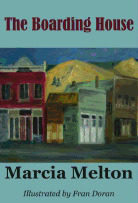 My guest this week is Marcia Melton, whose debut novel, The Boarding House, was just released by Raven Publishing Inc. Although written for middle grade readers, I was caught up in this story of survival. Marcia has captured the flavor of the early 1900s in the rough-and-tumble mining towns of Montana.
My guest this week is Marcia Melton, whose debut novel, The Boarding House, was just released by Raven Publishing Inc. Although written for middle grade readers, I was caught up in this story of survival. Marcia has captured the flavor of the early 1900s in the rough-and-tumble mining towns of Montana.
Synopsis:
The lives of eleven-year-old Emmie Hynes and her twelve-year-old brother, Conrad, are changed forever when a tragic mining accident kills their beloved Papa. Forced to bid a numb farewell to their home and friends in Butte, Montana, they move into a dilapidated boarding house in Philipsburg, a small town across the mountains. When Mama finally gets the boarding house shined up and running smoothly, and Emmie and Conrad are beginning to fit into their new community, a financial crisis threatens them with homelessness. Join Emmie and Conrad in the tumultuous world flavored with political intrigue, the fight for women’s suffrage, dangerous mining practices, and labor conflicts in 1914.
Marcia, congratulations on your young readers’ novel! Tell us where the idea and inspiration came for this book.
I grew up in Montana and for me, it is a place rich in family history and stories. Like many people (no matter where their place of roots is), I wandered to many other places, but now that I am able to spend more time in Montana, the stories are bubbling. There is a vast kaleidoscope of material here for me – both family stories and the stories of Montana in general.
I visited the small town of Philipsburg, Montana, where my great-great grandmother had run a boarding house and lo and behold, the building was still standing! When I stood in front of its weathered wood façade, a story just hopped out!
Why did you decide to write for young readers?
As a child, books and libraries were magical places for me. In the best of times, they held adventures and friends, and in the hardest of times, they held solace. My career was spent as a librarian and a teacher of children’s literature so a children’s book is comfortable territory for me.
I’ve always loved history and historical fiction which can truly resonate and make history come alive for young readers. Stories connect us (readers of all ages) through time to the history that has brought us to “now.”
I certainly can identify with you about the magic of libraries!
How much of the book is realistic?
The setting is in real places – Butte, Philipsburg, Anaconda, and Helena, Montana. The characters are fictional as are many of the events. As happens in writing, I think, I used memories and people from my family for my inspiration, but when I got into it and the story got going, it took on a life of its own and magically galloped along. By then, I was just glad to be along for the ride.
I did thorough research so that the story, dates, and events which occur within the context of the story would be accurate. The backdrop of mining and labor struggles, the suffrage movement, the events of 1914, the State Fair, and Jeannette Rankin’s leadership and speeches in favor of suffrage are all things which I researched to be able to accurately weave them into the story.
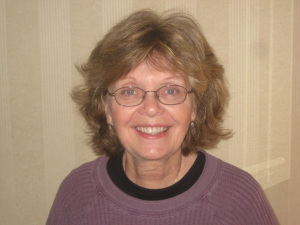 When did you first consider yourself a writer?
When did you first consider yourself a writer?
In many ways, I feel as though I am always learning to consider this. It is humbling. However, I’ve always like to write. Even in writing journals, letters, poems, and small stories, the hours would fly by and it felt like a special place to be where one could both “tell” and also “reflect.”
My grandfather, who was a small town newspaper columnist and poet for many years in Dillon, Montana, wrote me a letter on my 16th birthday in which he said, “Try to be a writer…[there is] a touch of class there.” I have that letter framed and sitting on my desk. Sixteen to now is, for me, quite a long time. Still trying!
Who/what motivates you to write?
When writing fiction, the best motivation is that feeling of entering another world, somehow crossing an imaginary threshold to see what will happen as the story and the characters take on a life of their own and “become real” (as in The Velveteen Rabbit). Time at one’s desk, or in the old green easy chair where I sit, keeps one world at bay, while another world beckons.
When working on researched writing such as articles, essays, or nonfiction, the interest and learning that comes from research, the treasure hunt aspect, is surely motivating.
Overarching all is that writing gives a way to share and connect with fellow lovers of ideas, books, and stories.
Are there any writers (living or dead) that have influenced you?
In the field of children’s historical fiction, the standard bearers for me are Katherine Paterson, Karen Cushman, Patricia Reilly Giff, Lucy Maude Montgomery, and Deborah Hopkinson. That being said, my all time favorite writer for children is E.B. White and for adults is Gabriel Garcia Marquez.
What do you find particularly challenging in writing?
Three words best answer this – Stick To It. I don’t know if having a “wandering mind” is a phenomenon for all writers… but for me, this is both a wonderful blessing and a challenge. Corralling my wandering mind to focus on working on the story at hand, instead of dreaming up new ones can be my biggest hurdle.
Do you have advice for beginning writers?
Those three words “Stick To It” are surely applicable again and at the same time, to follow your dreams and let the stories carry you away. Knowing that there will always be readers out there who need and want to sink into a good story (like we did growing up and all through life). The formats may vary and change, but the power of story-sharing stays the same. It connects us and for all writers, but especially for beginning ones, turning on this light gives a beacon and keeps us on the path. The integrity of staying with the story is first and then one can enter the whole bailiwick of the publishing world with the gem of your story in hand.
There are many publishing avenues available to beginning writers and creative ways to bring one’s words to the public. I felt very grateful to find a fine-quality, small, independent publisher, Raven Publishing, Inc. of Norris, Montana.
Are you working on another project?
Ideas are popping like popcorn and I hope to be able to write more Montana historical fiction for middle grade readers. This summer brought trips to two history-filled places in Montana — Fort Benton with visions of 1860’s steamboats along the levee, and Bannack with gold rush fever. I am hoping some characters and stories await here.
Where is the book available?
The book can be obtained at:
www.ravenpublishing.net, Baker and Taylor Books, Follett Library Resources, Bookstores throughout Montana, and www.Amazon.com
Bio:
I am a librarian and former teacher of children’s literature. My family roots echo back to the 1880’s in Montana in the Butte, Dillon, Philipsburg, Fort Benton, and Bears Paw mountain country. I have worked in many education settings from Head Start to higher education in Arizona, Montana, and New Zealand. I am glad to now be living back and forth between Arizona and our family cabin by the Gallatin River in Montana.



